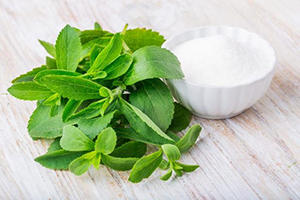When it comes to what we eat today, sugar added to foods could possibly be the biggest culprit when it comes to bad health.
As a result, other options have become popular - xylitol is one of them.
Not only does it resemble sugar, it tastes almost the same but has no negative effects in terms of blood glucose levels. And it sports fewer calories. There are also a number of studies that indicate that it may have benefits in terms of your teeth too.
Let's take a look at the evidence and see what xylitol can do for you.
The Basics
Xylitol is commonly found as a sweetener in sugar-free products. It is also found in some dental care items. While the taste is on par with sugar, it contains only 60% of the calories. It's a refined sweetener so it doesn't contain any vitamins, minerals or protein, making it a classic example of "empty" calories.
Xylitol occurs naturally in tiny quantities in a number of different veggies and fruit and our bodies even make tiny amounts of it through standard metabolic processes. On the molecular level it is considered a polyalcohol or sugar alcohol which, not surprisingly, is basically a cross between an alcohol and a sugar molecule. It's this structure that activates the taste receptors for sweetness on your tongue. (The alcohol part of the name is really a misnomer - it will not make you drunk).
Xylitol can be processed from birch trees or through a process that converts a plant fiber called xylan into xylitol.
Technically speaking polyalcohols are carbs but very few of them have any effect on blood glucose levels so they are not considered "net" carbohydrates. This is one reason they are popular for low-carb products.
It Won't Mess With Your Blood Glucose Levels
The reason that fructose is so bad for you is that it can quickly raise your blood glucose and insulin levels. Under a fructose onslaught, over time the body becomes less adept at handling the flood of sugar and you can start to develop metabolic issues. Xylitol, on the other hand, will not affect your metabolic system negatively. It has a listed Glycemic Index score of 7 as opposed to sugar's GI of between 60 and 70.
It is also better for weight loss because of its lower calorie count.
For those who do have metabolic issues, or who need to lose weight, xylitol is a good choice. Studies on rodents have indicated that xylitol plays an active role in the improvement of diabetic symptoms, the reduction of belly fat and might even help to stop you gaining weight. It should be noted, however, that as of the time of writing, studies have yet to confirm these effects in humans.
Xylitol Is Great For Your Mouth
Xylitol-sweetened gums are approved by many dentists to help improve dental health, based on a large number of studies that back up its tooth-decay prevention abilities.
To spell out why in a little bit of detail, if plaque-causing bacteria in the mouth are allowed to multiply the immune system is triggered to assail them and this can lead to Gingivitis where the gums become inflamed. Now, these bacteria consume the glucose in your food and get their energy from it. Replace that glucose with xylitol, a substance they are not able to use, and their food and energy supply is cut. But it gets better - the harmful bacteria do take in the xylitol which makes them full and unable to ingest glucose in. In effect, they end up starving.
One study showed that chewing xylitol gum decreased the damaging bacteria by anywhere from 27% to 75%, without negatively impacting the good bacteria.
But wait, there's more:
- Xylitol can up absorption rate of calcium in the body - this not only benefits the teeth but may help in the fight against osteoporosis.
- It revs up the amount of saliva produced - good because minerals in the saliva help the teeth to become remineralized.
- It helps balance the pH of saliva and this helps protect the enamel of teeth.
There are many studies that have proven that when you use xylitol you are cutting the risk of dental caries and decay by anywhere from 30% to 85%.
Bye Bye Candida And Kids' Ear Infections
Your ears, nose and mouth are all connected to one another and, as a result, dental bacteria are actually able to cause infections in the ear - something that most kids get frequently. The good news is that xylitol has the same effect on some of these nasty bacteria that it has on the bacteria that produce plaque - it starves them.
One study had children who were plagued by ear infections chewing xylitol gum daily. The infection rate dropped by 40%.
Candida is also no match for xylitol as it makes it harder for this yeast to adhere to surfaces and infect them.
We're Not Done Yet
When it comes to anti-aging, some studies have shown that the use of xylitol may help to rev up collagen production - something that generally slows with age - and so helps to maintain more youthful skin.
It may also be useful in the fight against osteoporosis - resulting in a higher bone volume and mineral content.
And, while it has a negative effect on the plaque-causing bacteria in the mouth, it actually feeds the good-guy bacteria in the gut that we need.
Dog Lovers Beware
Xylitol is highly toxic to dogs. When they eat it, their body's insulin response goes into overdrive and they are likely to develop hypoglycemia. This could kill them. It could also possibly damage their liver and, in high enough doses, cause the failure of that organ.
The amounts needed to create this effect are frighteningly small - only 0.1g for every kg of the dog's weight can lead to this adverse reaction. One piece of gum could have very unwanted effects on small dogs.
If you have a dog, you need to keep the xylitol away from your pet. If your dog does ingest some, get it to a vet fast.
How to Use it And Where To Get it
For most people there are no side effects but large quantities can cause digestion issues including diarrhea, bloating and gas. The way to avoid this is to start with the smaller doses and work your way up, giving the body a chance to get used to this substance. Keep near the bathroom when you do start to increase the amounts used. In addition, try a natural supplement to improve any offensive odors until your body acclimates to this change.
In the long term, it appears that it is safe to consume xylitol.
Should you want to try it out, take a look at Amazon and read the reviews.
People use it for any number of things - as a replacement for the sugar they would normally add to beverages, baking or cooking. Use the same amount that you would have if it was sugar.
There are also some other natural products you can use to sweeten your drinks such as Yacon syrup, that doesn't have the risk of side effects. However, it is important to pick a Yacon syrup that is pure and does not contain any additives. There are many Research Verified reviews which should help show you what to look out for when it comes to choosing a safe and effective supplement.












